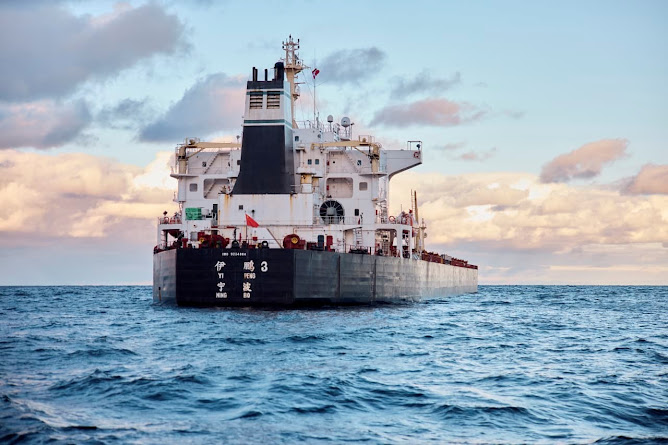Why Would China Undermine Global Shipping?
Its vessels are suspected of involvement in the sabotage of undersea cables.
By Elisabeth Braw
The Chinese-flagged ship Yi Peng 3 is anchored in the waters of the Kattegat strait near Denmark, Nov. 20. Photo: Mikkel Berg Pedersen/Zuma PressA ship allegedly linked to sabotage in the Baltic Sea resumed its voyage on Dec. 21 after spending a month in the waters of Denmark’s exclusive economic zone.
In November, North Atlantic Treaty Organization countries’ vessels had followed the bulk carrier on suspicion that it deliberately severed undersea fiber-optic data cables—one linking Germany and Finland and another linking Sweden and Lithuania—by dragging its anchor along the seabed for more than 100 miles.
The ship under suspicion bears China’s flag.
China has been less than cooperative with local authorities in Sweden, in whose waters the damage occurred.
This is no surprise considering the country’s record of noncompliance with maritime rules in other parts of the world.
China seems intent on proving that maritime rules are deficient.
That may be so, but the rules are better than maritime disorder.
Officially, the Chinese-flagged Yi Peng 3 is a merchant ship that transports cargo around the world.
On Nov. 17-18, when the two Baltic Sea cables in Sweden’s exclusive economic zone were cut, the vessel was in the area.
After the incidents, it sailed on toward the Atlantic Ocean.
When it stopped in Denmark’s exclusive economic zone, Swedish authorities thought China would help them investigate the severed cables.
Under the United Nations Convention on the Law of the Sea, which forbids sabotage of undersea infrastructure during peacetime, flag states have such responsibilities.
But according to Sweden, instead of cooperating, China barred the Swedish prosecutor from boarding the Yi Peng 3, and the ship sailed away.
This was the second time in recent months that a Chinese merchant ship sailed off after suspected cable sabotage in the Baltic Sea.
In October 2023, after two data cables and a pipeline between Finland and Estonia were damaged by an anchor dragged across them, the Hong Kong-flagged, Chinese-registered vessel Newnew Polar Bear was the prime suspect.
But when local authorities asked China to cooperate in the investigation, they received no response.
Meantime in the Red Sea, Yemen’s Iran-backed Houthis are attacking Western-linked ships with powerful weapons, some provided by Iran, and with some targeting data provided by Russia.
Even though the Law of the Sea convention grants every merchant ship the right of innocent passage through any waters and the People’s Liberation Army Navy has the world’s largest fleet of active warships, Beijing has done nothing to enforce order in this crucial waterway.
Western-linked ships continue to sustain assaults while Chinese ships sail through the Red Sea largely spared from Houthi attacks.
And in the South China Sea, Beijing is increasingly using its impressive maritime power to harass vessels in the waters of neighboring countries—waters that Beijing claims as its own.
“First, fishing vessels from the Chinese Maritime Militia swarm a location, and then they’re joined by ships from the Chinese coast guard,” Ewan Lawson, a Manila-based fellow at the Royal United Services Institute, a defense think tank, said in a phone interview.
“And because the Chinese are using the coast guard, any response by the other country’s navy would be seen as an escalation.”
Shortly before relinquishing command of the U.S. Indo-Pacific Command, U.S. Adm. John Aquilino told reporters last spring: “Philippine coast-guardsmen and service members have been injured.
That’s a step up the ladder beyond a pressure campaign.”
Undermining the global maritime order seems an odd strategy for a country that owes its rapid economic rise to the oceans.
Until a decade or so ago, Beijing mostly collaborated in the maritime order.
When piracy skyrocketed off the Horn of Africa in the early 2000s, Chinese vessels joined Western and Russian ships to deter it.
Retired Vice Adm. Duncan Potts of the Royal Navy, who commanded the antipiracy Operation Atalanta in the Indian Ocean in the early 2010s, said in a phone interview that “at that time China participated in an information exchange program with Western navies.
We even explored whether Chinese tankers could refuel tankers in the Indian Ocean.
But today it’s a very different situation.”
Chinese leaders now publicly dismiss maritime rules as outdated.
The Law of the Sea convention “should keep pace with the times to better adapt to international maritime practices,” Foreign Minister Wang Yi argued at the convention’s 40th anniversary event in 2022.
Like other agreements and treaties conceived during the Cold War, the maritime pacts contain a large Western footprint.
For this reason, Beijing seems eager to refashion them.
China is sacrificing ocean safety in its quest for a post-Pax Americana world.
Its recurrent game isn’t as dramatic as a direct naval assault.
But it’s even more dangerous.
Around 80% of global trade travels by sea and requires protection.
Similarly, the vast amounts of data, energy and money that travel via undersea cables and pipelines depend on orderly oceans.
By undermining maritime pillars, Beijing is causing disorder that will harm every country that depends on oceans for its prosperity—including China.
Countries from Cambodia to the United Arab Emirates dislike details in existing treaties (and the U.S. hasn’t ratified the Law of the Sea convention, although it adheres to it), but the deterioration of those treaties benefits no one.
Beijing’s friends and foes should call out its behavior before the maritime order deteriorates beyond repair.
Ms. Braw is a senior fellow at the Atlantic Council and an adviser to Disruptive Industries.

0 comments:
Publicar un comentario